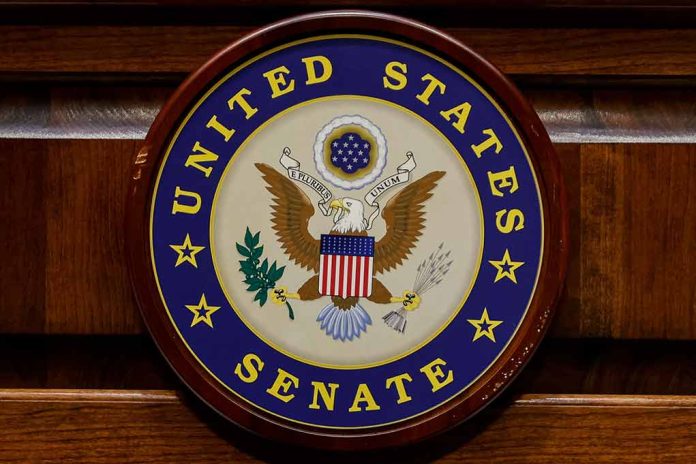
The Senate takes a decisive step as it gears up to vote on legislation aimed at expanding Social Security benefits, potentially impacting the financial futures of millions.
At a Glance
- The Senate votes on the Social Security Fairness Act to benefit 2.8 million people.
- The act removes policies limiting payouts for public servants’ earnings.
- Concerns over the bill’s $195 billion impact on the federal deficit.
- Bipartisan support exists, but opposition cites future insolvency risks.
Senate Poised to Vote
The Senate is on the cusp of voting on the pivotal Social Security Fairness Act that could extend full benefits to about 2.8 million Americans. Senate Majority Leader Chuck Schumer spearheads this initiative, emphasizing the importance of enhancing economic security. The bill seeks to address and rectify longstanding inequities within the current framework by eliminating policies like the Windfall Elimination Provision and the Government Pension Offset, targeting individuals with public service careers.
The act has successfully passed the House, enjoying bipartisan backing, and currently boasts 62 cosponsors within the Senate. However, it requires at least 60 votes to advance to President Biden’s desk for final approval. Lawmakers intend to secure enactment before the session concludes, preventing the proposal from lingering during the lame-duck period.
🚨Today, @SenSchumer pledged to bring my #SocialSecurityFairnessAct up for a vote in the U.S. Senate — bringing us one step closer to making sure every Virginian gets the Social Security benefits they paid into and earned.
Rain or shine, I'm committed to ending this theft. pic.twitter.com/fEreTAXkRH
— Rep. Abigail Spanberger (@RepSpanberger) December 12, 2024
Financial Concerns and Opposition
The Congressional Budget Office projects that the Social Security Fairness Act would increase federal deficits by $195 billion over the next decade. There are fears that it could precipitate Social Security insolvency by about six months, potentially reducing lifetime benefits for some retirees. The Committee for a Responsible Federal Budget cautions about these fiscal repercussions, echoing concerns held by certain legislators.
Senator Mike Braun, while undecided, highlights the challenge of increasing federal debt without methods for offsetting costs: “Nothing ever gets paid for, so if it’s further indebtedness, I don’t know.” Meanwhile, Senator Rand Paul voices opposition due to concerns over the potential costs and implications the bill could levy on the nation’s future.
“Even for something that people consider to be a good cause, it shows a lack of concern for the future of the country, so I think it would be a big mistake.” – Sen. Rand Paul
Support for Public Servants
Supporters, including Senator Bill Cassidy, argue the legislation promotes fairness by correcting unjust penalties on those in public service roles, such as educators, firefighters, and law enforcement personnel. These federal restrictions wrongly penalize families nationwide for committing to public service jobs, Cassidy asserts. Both Schumer and Cassidy remain optimistic about the bill’s passage, believing it addresses critical flaws in the Social Security system.
The effort to enact this legislation underscores a broader need to reform Social Security comprehensively, ensuring future viability and dependability for upcoming generations. While the bill remedies certain immediate disparities, its journey through the legislative process represents broader financial and societal discussions about the longevity and adaptability of Social Security.
Sources:
- Senate begins final push to expand Social Security benefits for millions of people
- Senate Advances Social Security Fairness Act to Expand Benefits for Millions
- Senate Works to Expand Social Security Benefits for Millions of People










